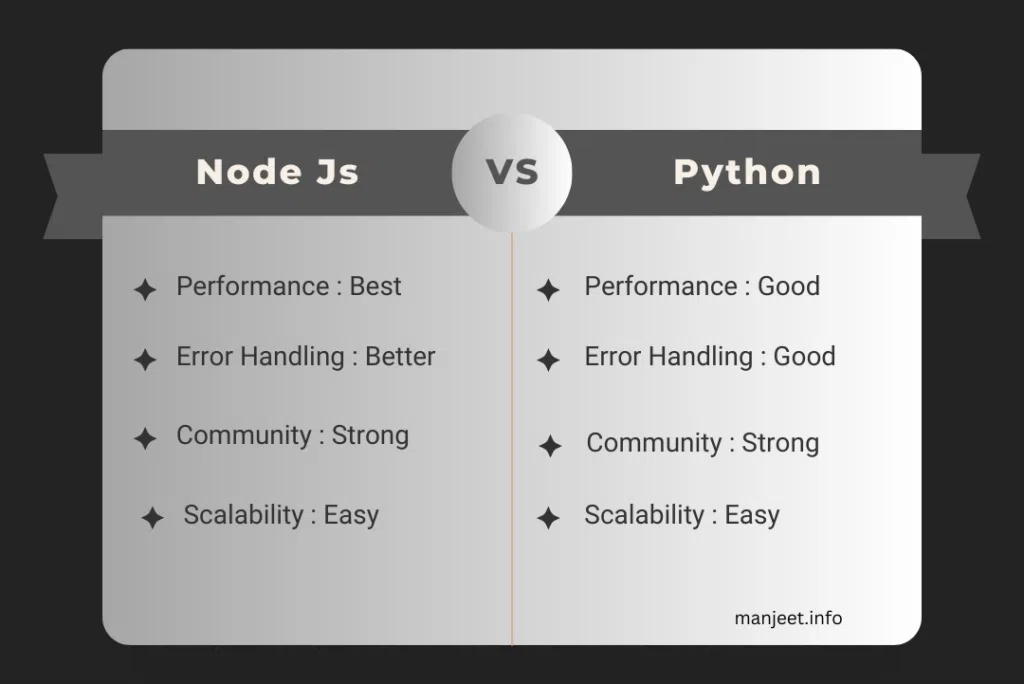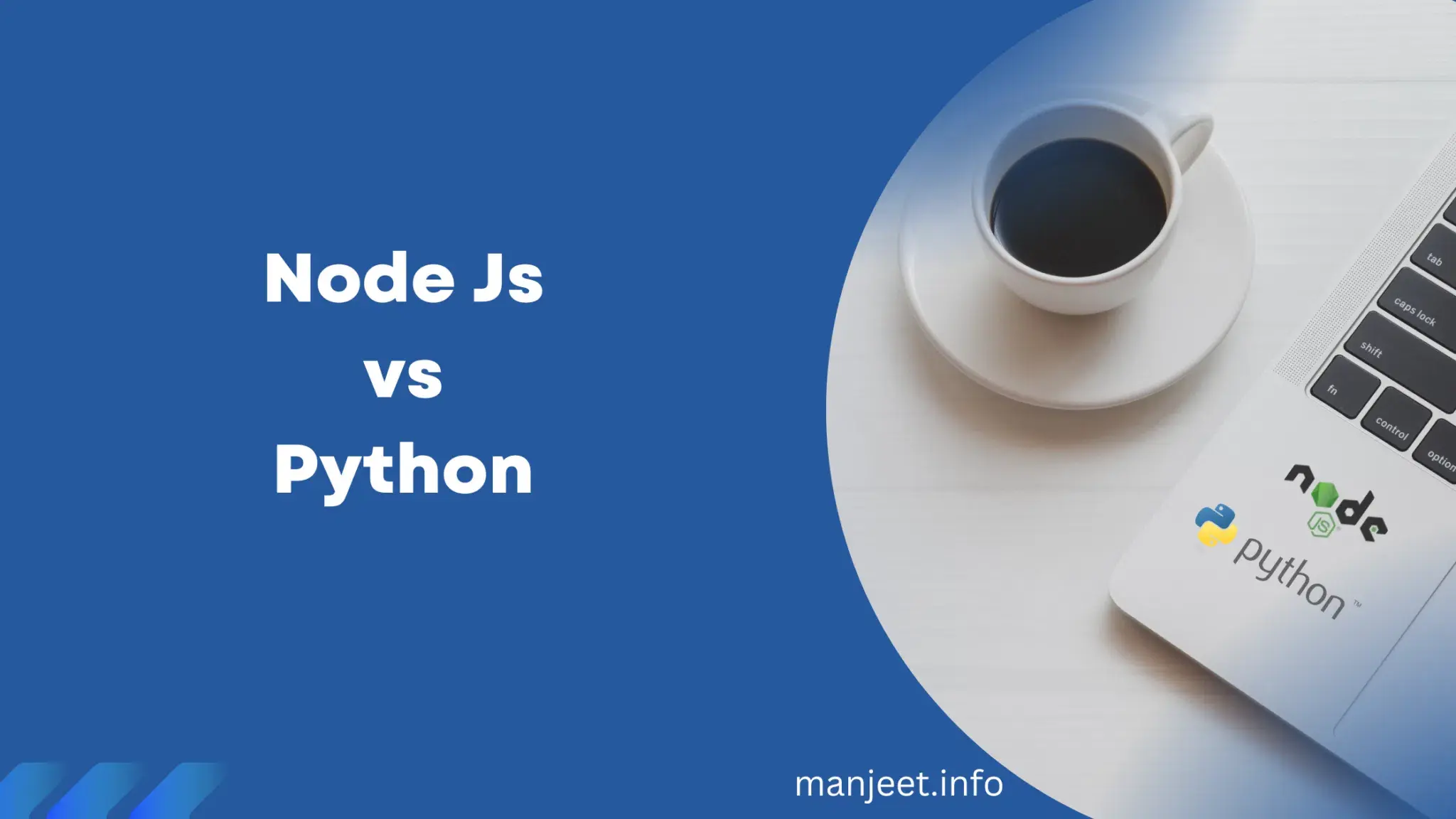The world of software development offers many programming languages that can be used, each with its own features and advantages. Node.js and Python are two of the most popular languages. These two languages have been popular, widely adopted, and have a large fan base, but they are highly different in design, syntax, and features. This paper will give a more detailed consideration of Node.js and Python and contrast them based on their main aspects, applications, and speed.
Node Js
Node.js is a JavaScript run-time based on the V8 JavaScript engine used for server-side JavaScript. It was developed in 2009 by Ryan Dahl and was widely adopted as a preferred tool to create scalable (real-time) applications.
Node.js is based on an event-driven, non-blocking I/O model, meaning it can handle large amounts of concurrent connections without experiencing blocking of subsequent requests. The high speed is one of the most significant benefits of Node.js. Since it relies on the V8 engine, which is performance-optimised, Node.js can accept a wide variety of requests in a short period. Node.js is also scalable, implying that as the number of users and requests increases, Node.js will not lose its performance and become slow.
Node.js can be utilised to create web applications, APIs, real-time applications, e.g., chat applications, and online gaming platforms. It supports a broad ecosystem of modules and packages, and finding and using a third-party library to perform everyday tasks is simple.
Regarding syntax, Node.js can utilise JavaScript, one of the most popular and simple languages. This facilitates developers' entry to learn Node.js, without necessarily having prior knowledge about server-side development. Another strength of Node.js is that the community of developers and contributors is also substantial, so there are many resources and people ready to help new developers get started.
Python
Python is a general-purpose programming language that was initially released in 1991. It is considered readable and straightforward, with ease of use, and while beginners often choose it, experienced developers also use it.
Python is usually deployed in artificial intelligence, machine learning, data analysis, scientific computing, and web development. The versatility of Python is one of its key benefits. With Python, you can get several applications, whether a small script or a significant project. It boasts an extensive and vibrant developer community, so everyday tasks have a vast choice of third-party libraries and modules.
Python has readability and ease. Its language is common and can be learned within a short duration; therefore, it is a good language to be used by a beginner. Python is also very readable, making it easy to maintain, even on complex projects. Performance-wise, Python tends to be slower than Node.js, particularly regarding extensive data or computation-intensive work.
Nonetheless, Python has multiple tools and libraries that can enhance its performance, including NumPy and Pandas when data is to be analysed and TensorFlow and PyTorch when conducting machine learning procedures. There are applications in Python associated with constructing web applications, APIs, and data processing. Subsequently, it has a vast and vibrant developer base; hence, numerous support and resources can be available to those unfamiliar with the language.

Comparison
There are several considerations when selecting whether to use Node.js or Python. Node.js is also faster and more scalable than Python and, therefore, preferred if you want to make real-time applications and need to respond to high numbers of simultaneous requests.
Nevertheless, Python is more flexible and can be applied to various tasks like web development, data analysis, and machine learning. The ease of use is another variable to be taken into consideration. Although the two languages are not too hard to learn, Node.js relies on JavaScript, a language more known to front-end developers.
Python, however, is more readable, understandable, and more straightforward in syntax, especially to amateurs. Regarding the ecosystem, Node.js has more modules and packages, making it easier to find and use third-party libraries. Python also enjoys a large ecosystem, which is more scientifically oriented than data-related.
Node.js vs Python: A Comparison of Key Features and Characteristics
- Performance: Node.js is based on the V8 engine, giving it incredible speed and the capability to process many I/O operations and real-time applications. Regarding the I/O operations, Python is overall slower than Node. It is just that the former is more adaptable to the more complicated calculations, along with machine learning.
- Syntax: Node.js is based on simple JavaScript. It is also known that Python is characterised by the simplicity and readability of the syntax, which makes the language popular among novice programmers and those who have already gained experience.
- Libraries and frameworks: Node.js and Python possess a broad, active community of developers who have developed multiple libraries and frameworks to serve all sorts of purposes. Node.js is famous for its abundant web application development modules. In contrast, Python is most commonly used in scientific computing, machine learning, and data analysis, with libraries like NumPy, Pandas, and TensorFlow.
- Scalability: Node.js has an architecture to scale to high levels of requests and concurrent connections, and therefore, it is perfect for building scalable web applications. Python can also be used with high traffic, but it may need more configuration and optimisation.
- Learnability: Node.js and Python are fairly beginner-friendly and have lots of documentation and a developer base. Nonetheless, Node.js can be simpler to implement in your first projects because of its syntax comfort and ease.
- Community: Node.js and Python have huge and active developer communities, and lots of books and online documentation exist that can teach you and help you debug problems.
Conclusion
To summarise, Node.js and Python are versatile and potent programming languages that many rely on in the software creation sector. Both languages have advantages and disadvantages, but the two can be used to create high-performance and scalable applications. Regarding what to choose between Node.js and Python, one should look at the project's necessities and select the language that will best suit their interests.
Read more: Top 10 Node.js Frameworks
